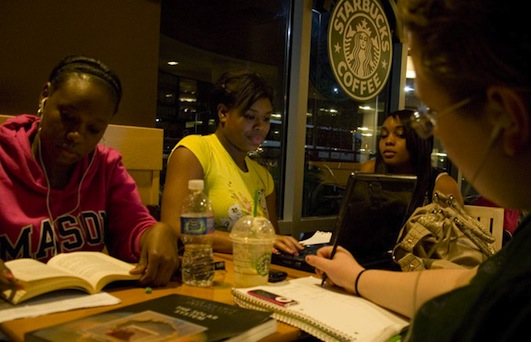Sleep isn’t priority on campus, but experts say it should be

Mason students Phyllis Bijole, Meghan Holmes, Shawnta Nixion and Amanda Healing have a late night study session at the campus Starbucks.(Andrew Loeber)
Snuggled in bed and about to drift off to sleep sometime after midnight, the nightly laughing crew commences in the hallway and your roommate bursts into the room with her boyfriend.
There goes your peaceful sleep.
Sleep deprivation affects 80 to 90 percent of college students, and getting a good night’s sleep is essential to staying healthy but is often overlooked, according to Patrice Levinson, a nurse practitioner at George Mason University.
“The best thing is to have a consistent sleep-wake schedule,” Dan Gartenberg said, a graduate student studying psychology at Mason. Most people need seven to eight hours of sleep, though it can vary according to the individual.
Gartenberg said sleep deprivation has short-term effects such as increased blood pressure and desires for fatty foods, a weakened immune system, a harder time remembering things and a decrease in sense of humor.
He also said long-term effects include an increased chance for obesity and developing diseases and a decrease in life-span.
Will Mullery, a sophomore Graphic Design major, gets around six hours of sleep every night but said it works for him and does not affect the quality of his coursework.
“I’m a little more tired than most people, but I’m used to it,” Mullery said.
Kathyrn Makin, a sophomore English major, had trouble sleeping her freshman year because of disturbances like laughing and yelling in her residence hall. She got around five hours of sleep every night and experienced some of the short-term symptoms of sleep deprivation.
“It was like being on autopilot.” Makin said. “I could think, but you don’t really think when you get that little sleep for so long…my body wouldn’t let me wake up.”
While Makin was up late at night because of external disturbances, other students stay up by choice.
George Mason students reported pulling all nighters for homework or social reasons and having trouble staying awake in class or sleeping all day.
Morning classes are sometimes difficult because the students stay up late and do not participate as much as they do in her afternoon classes, said Cynthia Lehman, a professor of communication.
“You become nocturnal when you go to college,” Lehman said.
According to Gartenberg, the idea that staying up late or pulling all nighters will help prepare for a test is a misconception because it negatively affects cognitive skills.
“Pride in not sleeping much is like pride in not exercising," Gartenberg said. “It doesn’t make sense.”
Gartenberg also corrected other misconceptions about sleep.
He said people should only go to sleep if they are tired, caffeine and exercising before bed disturbs sleep, and alcohol does not help people fall asleep, but rather disrupts sleep and decreases its quality.
George Mason University has options to help students combat sleep deprivation.
The Office of Housing and Residential Life has quiet hours starting in the dormitories starting at 10 pm on weekdays and 12 am on weekends and 24 hour courtesy hours during final exams.
“I think they [quiet hours] are very well enforced,” said Brad Menerd, the assistant director for residence life. “It’s something we really push for with the RA’s [resident assistants]…We don’t get complaints.”
Housing publishes the “Guide to Pride” and the “Roommate Bill of Rights” to help roommates have a quiet place to sleep and study. Housing also provides healthy living opportunities such as the Mindful Living Learning Community and programs such as meditation and yoga.
Student Health Services also provides information about sleep deprivation and sleep disorders and will see students who make appointments because they are having trouble sleeping.
SHS may prescribe medication or recommend herbal substances to help patients sleep, but according to Levinson, many of the students who go to SHS complaining of sleep deprivation have other symptoms, such as anxiety and a loss or increase of appetite, that point to depression.
SHS is busiest with patients coming in with sleep deprivation around finals because students have increased stress, weakening their immune systems.
“Sleep isn’t priority,” Levinson said.
